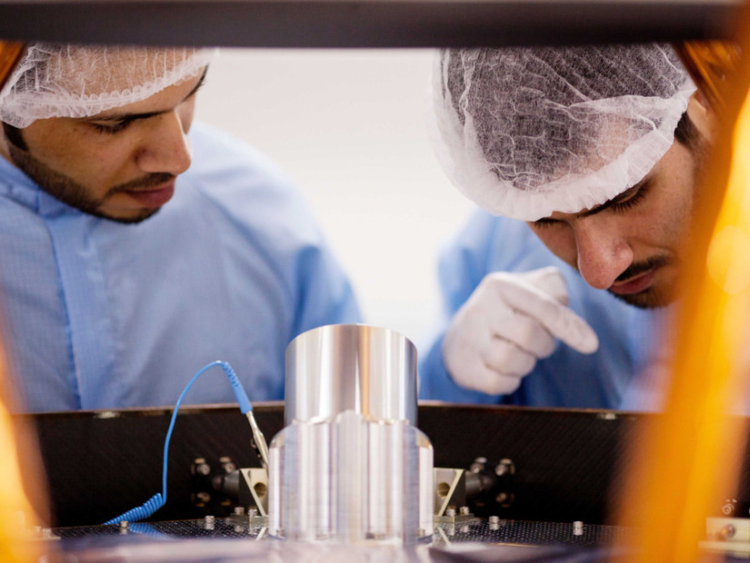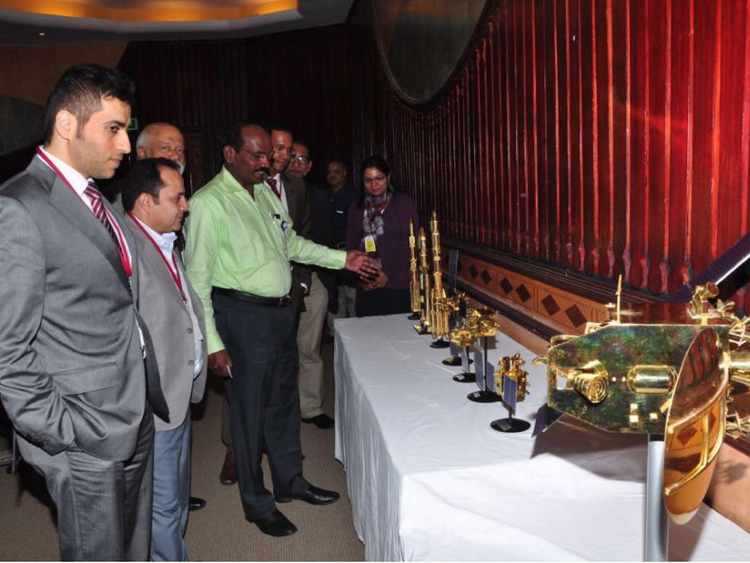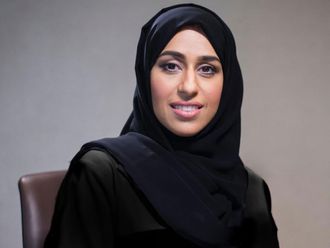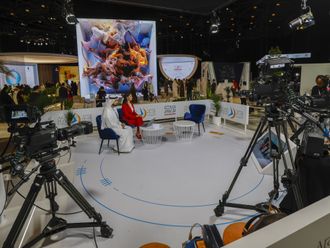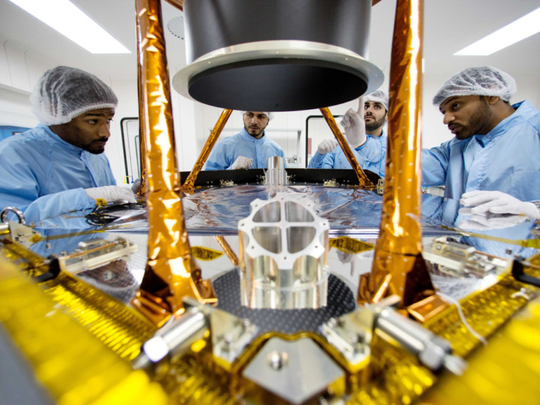
Bengaluru: After forging a stronger relationship on all matters earthly in the past few years, the UAE and India are now aiming to boost their bilateral ties in the sky.
A joint working group set up between the UAE Space Agency and the Indian Space Research Organisation (Isro) have identified key areas for cooperation — including the UAE’s Mars mission, remote sensing applications and satellite platforms — in their first meeting held in December 2017, the chairman of Isro said on Monday. Dr K. Sivan was speaking at a media interaction in Bengaluru ahead of Indian Prime Minister Narendra Modi’s visit to the UAE this weekend.
“The areas of cooperation possibilities also include satellite navigation and sounding rockets, while Isro has provided a report to the Arab Civil Aviation Commission on the possibility of using Gagan [GPS Aided Geo Augmented Navigation] satellite navigation services in the region,” Dr Sivan said. The working group meeting follows the signing of a MoU between the two countries in 2016 on space research and exploration.
Following its successful mission to Mars in 2013, India is well positioned to offer its expertise to the UAE, which plans to launch the Hope orbiter to Mars in 2020, Dr Sivan said. India became the world’s only country to successfully launch a Mars mission in its first attempt. Its Mars orbiter was planned to last only six months — yet after more than 3 years and 4 months, it’s still intact in its orbit and transmitting key data back to Earth, Dr Sivan said.
On the UAE’s plan to build a colony in Mars by 2171, Dr Sivan said: “I’m very happy to see the UAE’s great vision for the future in action. In India, Dr Vikram Sarabhai, the father of our space programme, had a similar vision 50 years ago — and today at Isro we are reaping the results of that vision. The UAE’s Mars Mission is therefore a great and a very necessary idea.”
Other areas where both nations could potentially collaborate include help with satellite based search and rescue missions — whether for missing fishermen or for maritime security — under the ambit of the COSPAS-SARSAT agreement, said Dr P.G. Diwakar, scientific secretary at Isro. Indian space technology has gained attention from the UAE and other nations exploring the frontiers of space due to its robust yet flexible systems and its cost-effectiveness, he said.
Noting that Dr Khalifa Al Rumaithi, chairman of the UAE Space Agency, visited Isro in September 2015 to discuss avenues for building space cooperation, Dr Sivan said his agency could also look at facilitating the training of Emirati space scientists in Indian space research institutions. “Such collaboration will only help make India-UAE relations stronger,” he said.
With the successful launches of India’s moon mission in 2008, which confirmed for the first time the presence of water on Earth’s satellite, and the Mars mission and launch of Astrosat in 2015, Indian space science has moved far beyond the age when it used to transport rockets on bicycles and satellites on bullock carts, said Dr D. Gowrisankar, Deputy Director of International Cooperation at Isro. The agency today boasts nearly 240 space cooperation agreements with 28 countries, he said.
“Isro is pursuing a space programme for the last five decades with the goal of developing space technology and its applications to solve the real problems of man and society. Today, we are self-reliant in building, launching and operating satellites for earth observation, communication, navigation and planetary exploration. Our focus is on building a vibrant application programme for social benefits,” Dr Sivan said.
UAE-India space relations
May 2015: The UAE Space Agency is inaugurated, with Dr M. Annadurai, who leads the satellite programme of Isro, in attendance at the inaugural ceremony.
August 17, 2015: Promoting space cooperation between the two nations is highlighted during the visit of Indian Prime Minister Narendra Modi to the UAE.
September 2015: The 11th meeting of India-UAE Joint Commission for Economic and Technical Cooperation in New Delhi discusses space cooperation. Dr Khalifa Al Rumaithi, chairman of the UAE Space Agency, visits Isro.
February 11, 2016: Isro and the UAE Space Agency sign a Memorandum of Understanding on cooperation in the exploration and use of outer space for peaceful purposes.
February 2017: Nayif-1, a nano-satellite from the UAE developed by American University of Sharjah students to collect environmental space data, was successfully launched as part of a record 104 satellites by a PSLV of Isro.
January 2018: The Indian embassy and consulate in the UAE confirms that Dr K. Radhakrishnan, a former chairman of Isro and the key architect of India’s Mars mission, will join the advisory board of the UAE Space Agency.
February 11, 2018: A top Isro delegation is scheduled to participate in the World Government Summit in Dubai.


